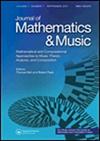为什么拓扑?
IF 0.7
2区 数学
Q4 MATHEMATICS, INTERDISCIPLINARY APPLICATIONS
引用次数: 6
摘要
音乐理论家已经将声音引导建模为通过高维配置空间的路径。本文使用拓扑技术构建二维图,捕捉这些空间的最重要特征。目标是通过简化集合论的几何描述来丰富集合论的对位能力。在此过程中,我将同伦理论与“变换理论”联系起来,展示了集合类空间如何推广新黎曼变换,将Tonnetz扩展到任意和弦,并开发了一个简单的对位“字母表”来描述语音引导。我提到了几个作曲的应用,并分析了杰叟尔多、莫扎特、瓦格纳、斯特拉文斯基、勋伯格、施尼特克和马哈塔帕的作品。本文章由计算机程序翻译,如有差异,请以英文原文为准。
Why topology?
Music theorists have modeled voice leadings as paths through higher-dimensional configuration spaces. This paper uses topological techniques to construct two-dimensional diagrams capturing these spaces’ most important features. The goal is to enrich set theory’s contrapuntal power by simplifying the description of its geometry. Along the way, I connect homotopy theory to “transformational theory,” show how set-class space generalizes the neo-Riemannian transformations, extend the Tonnetz to arbitrary chords, and develop a simple contrapuntal “alphabet” for describing voice leadings. I mention several compositional applications and analyze short excerpts from Gesualdo, Mozart, Wagner, Stravinsky, Schoenberg, Schnittke, and Mahanthappa.
求助全文
通过发布文献求助,成功后即可免费获取论文全文。
去求助
来源期刊

Journal of Mathematics and Music
数学-数学跨学科应用
CiteScore
1.90
自引率
18.20%
发文量
18
审稿时长
>12 weeks
期刊介绍:
Journal of Mathematics and Music aims to advance the use of mathematical modelling and computation in music theory. The Journal focuses on mathematical approaches to musical structures and processes, including mathematical investigations into music-theoretic or compositional issues as well as mathematically motivated analyses of musical works or performances. In consideration of the deep unsolved ontological and epistemological questions concerning knowledge about music, the Journal is open to a broad array of methodologies and topics, particularly those outside of established research fields such as acoustics, sound engineering, auditory perception, linguistics etc.
 求助内容:
求助内容: 应助结果提醒方式:
应助结果提醒方式:


